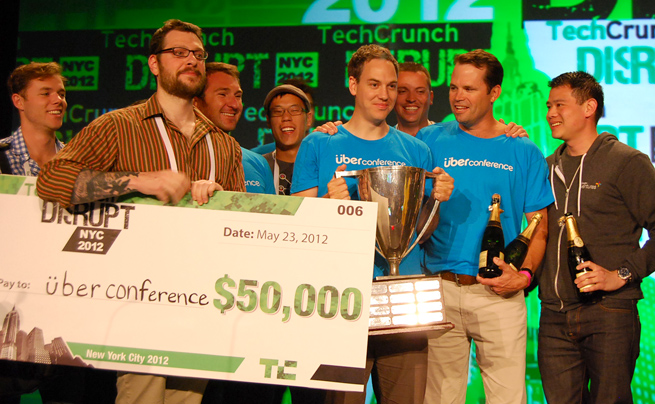Six companies battled it out for dominance at TechCrunch Disrupt’s Startup Battlefield today, but only one came out in top. That company was UberConference, a promising conference call startup from the creator of Google Voice.
[aditude-amp id="flyingcarpet" targeting='{"env":"staging","page_type":"article","post_id":459777,"post_type":"story","post_chan":"none","tags":null,"ai":false,"category":"none","all_categories":"business,","session":"D"}']Craig Walker, the inventor of both Google Voice and DialPad, aims to reinvent conference calls with UberConference. The service, which was created by Firespotter Labs, wants to fix many of the problems that traditional conference calls have, including not knowing who is speaking as well as the often terribly annoying feedback.
Using a variety of tech, UberConference calls show who is talking, mutes lines of people who aren’t speaking, and generally tries to fix any of those weird quirks that plague every conference call you’ve ever participated in. The service is free for now, but in the future it will “offer a premium version of the service with more features and different pricing options.” We can’t wait to see more from the service and give it a try in the near future.
AI Weekly
The must-read newsletter for AI and Big Data industry written by Khari Johnson, Kyle Wiggers, and Seth Colaner.
Included with VentureBeat Insider and VentureBeat VIP memberships.
Even though UberConference won, there were five other strong competitors (certainly stronger than last year’s underwhelming crop) in the competition. It was hard to guess which one would win because several were highly appealing in their own ways.
Check out the other five below:
gTar might have been one of the coolest startups at the entire Disrupt event, and it rightly was the runner-up of the Startup Battlefield. It was also one of the few companies at the event debuting hardware instead of software.
The five-employee company has developed a “guitar that anyone can play.” Using a combination of iOS software and smart hardware, you can plug an iPhone into a slot on custom-made guitar and have the phone tell you when to play notes. It gets better than that, though: You can pick easy, medium, or hard to help you play in time and learn songs. In easy mode you just need to pluck strings in time, while in hard you have to play notes and frets correctly.
[aditude-amp id="medium1" targeting='{"env":"staging","page_type":"article","post_id":459777,"post_type":"story","post_chan":"none","tags":null,"ai":false,"category":"none","all_categories":"business,","session":"D"}']
Stunningly, the company has raised more than $188,000 on Kickstarter in just a few days, which shows that gTar has seriously connected with tech enthusiasts and casual fans alike. The first 500 units produced should be in people’s hands within 3 to 4 months. With that fat stack of cash, we expect the startup to fulfill those orders.
The company says its aim is to ultimately create a platform for people making music and those who want to learn how to play songs.
[aditude-amp id="medium2" targeting='{"env":"staging","page_type":"article","post_id":459777,"post_type":"story","post_chan":"none","tags":null,"ai":false,"category":"none","all_categories":"business,","session":"D"}']
What happens when two PhDs in “search” create a people search engine? Enter Ark, a people search engine that taps Facebook, Google, LinkedIn, and others to help you find info on people and connect you. The early applications of the service might be classified as mostly dating and sales, but the company’s founders believe it could change how we use search.
Giving the company extra cred, it claims to have walked away from acquisition talks with Facebook, and has raised $4.2 million in seed funding from Andreessen Horowitz, Greylock Partners, SV Angel, and others.
CrunchFund partner and former TechCrunch editor Michael Arrington, who was one of the judges, seemed impressed that the two founders had PhDs in search. He asked fellow judge and Google VP Marissa Mayer if she could boast the same, to which she said she just had a lowly Master’s.
[aditude-amp id="medium3" targeting='{"env":"staging","page_type":"article","post_id":459777,"post_type":"story","post_chan":"none","tags":null,"ai":false,"category":"none","all_categories":"business,","session":"D"}']
Babelverse offers a crowd-sourced marketplace for translation. People who need translation can tap into the service for per-minute fees. Both amateur and professional interpreters sign up to provide their talents and keep a cut of the pay.
The company’s founder says that automated translation, such as Google Translate, is still not there yet. As suchm they say using a translator is much better experience. We believe the service would certainly come in handy, and if you give automated translation services a few years, Babelverse could dry up in usefulness.
[aditude-amp id="medium4" targeting='{"env":"staging","page_type":"article","post_id":459777,"post_type":"story","post_chan":"none","tags":null,"ai":false,"category":"none","all_categories":"business,","session":"D"}']
Open Garden’s service wants to make it possible to crowd-source mobile and Wi-Fi bandwidth like no one has ever seen before. Basically, if people voluntarily pool their bandwidth together, there’s a much better chance of never being without access to data again. The company claims its service has attracted 1 million installs to date with little to no marketing.
Personally, I find it hard to believe a lot of people will want to share their mobile data with strangers, but if enough people who are frustrated with their data want to give Open Garden a shot, it could be a winning product.
[aditude-amp id="medium5" targeting='{"env":"staging","page_type":"article","post_id":459777,"post_type":"story","post_chan":"none","tags":null,"ai":false,"category":"none","all_categories":"business,","session":"D"}']
Sunglass offers a cloud-based way to create, edit, and share 3D designs, giving consumers an easier and cheaper alternative to traditional software like AutoCAD.
It used to be that only powerful desktops could run CAD software, and collaboration was a nightmare. But with Sunglass, you could collaborate with just about anyone right from your web browser. All of the heavy-duty processing work happens on the company’s servers. That’s a pretty heavy level of disruption for those who need 3D modeling software, and we can easily see this startup taking off.
VentureBeat's mission is to be a digital town square for technical decision-makers to gain knowledge about transformative enterprise technology and transact. Learn More
